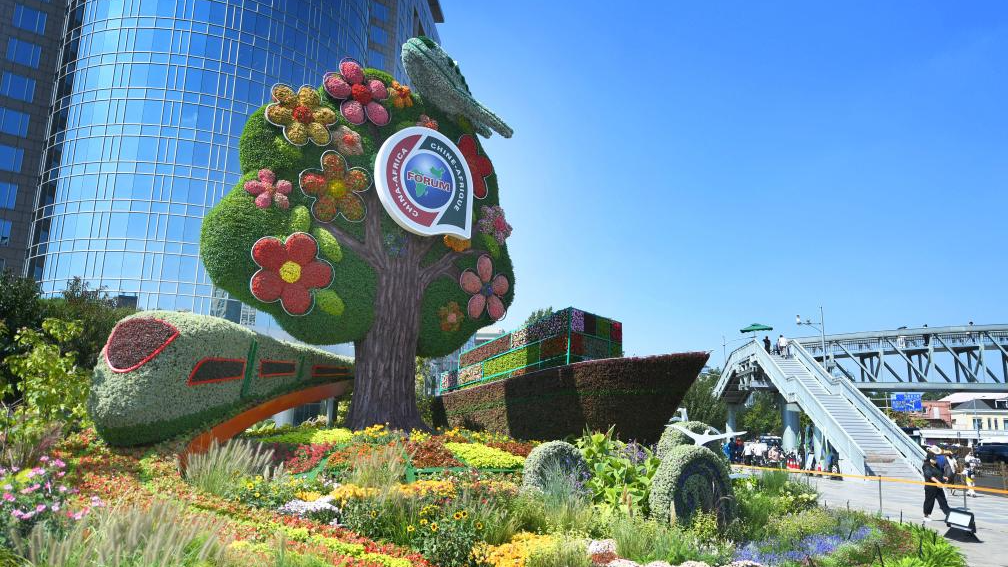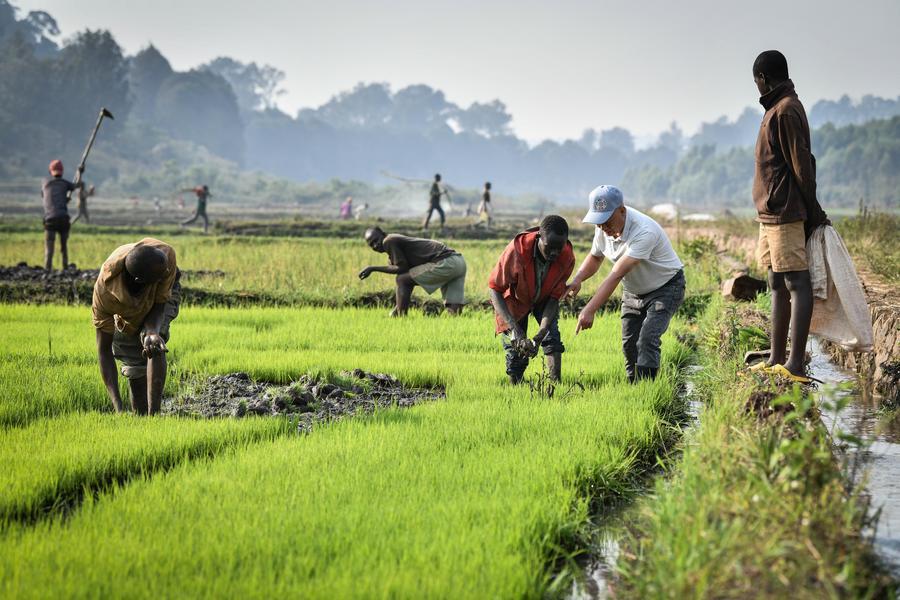
A floral decoration marking the 2024 Summit of the Forum on China-Africa Cooperation (FOCAC) in Beijing, capital of China, August 29, 2024. [Photo/Xinhua]
By Alexander Ayertey Odonkor
The 2024 Summit of the Forum on China-Africa Cooperation (FOCAC), which kicked off on September 4 in Beijing, reaffirming its role as the most comprehensive platform and multilateral mechanism for Sino-Africa relations, has brought together major players from China and Africa including various representatives of the continent's sub-regional organizations and international organizations from around the world.
Themed "Joining hands to advance modernization and build a high-level China-Africa community with a shared future," the event presents an important opportunity for the two parties to discuss cooperation, renew friendships and map out a plan of action for the medium and long-term.
One of the key areas of cooperation expected to dominate discussions at the summit is agriculture. Since time immemorial, agriculture has served as a pivotal foundation for China and African economies, contributing to alleviate poverty, and improve food security and living standards.
Since its inception in 2000, FOCAC has prioritized agricultural cooperation, addressing common challenges in modernization and development. The partnership has expanded into various areas, including agro-industries, food security, capacity-building, agricultural technology, finance and trade. Over the past 24 years, this cooperation has produced tangible results, significantly contributing to economic growth in both regions.
In agricultural trade, FOCAC has been instrumental in eliminating bottlenecks that impede China-Africa agricultural cooperation. At the eighth Ministerial Conference of FOCAC in 2021, China introduced a "green channel" for African agricultural products entering the Chinese market. Since its implementation, this initiative has expanded tariff exemptions and expedited quarantine and inspection processes for African agricultural products. As of June 2023, 16 agricultural products from 11 African countries had accessed the Chinese market through the "green channel," boosting Africa's agriculture exports to China.
In 2023, China, the second-largest market for agricultural exports from Africa, imported $5.32 billion worth of agricultural products from the continent. Initiatives such as the "green channel" boosted Chinese imports of African nuts, vegetables, flowers and fruits by 130 percent, 32 percent, 14 percent and 7 percent respectively, compared to the previous year.
These efforts under FOCAC have strengthened China-Africa agricultural trade, which grew from $650 million in 2000 to $6.92 billion in 2018, averaging a 14 percent annual increase. For Africa, with 65 percent of the world's uncultivated arable land but lagging productivity, enhanced cooperation with China, which has less than 10 percent of the world's arable land yet feeds nearly a fifth of the global population, has brought invaluable resources to the region.
Africa's agricultural productivity has long been hindered by a lack of inputs, limited access to agricultural advisory services under a predominantly rainfed agricultural system, where farms and farmers are susceptible to climate change yet rely on outdated production methods. These challenges have exacerbated food insecurity, malnutrition, and poverty across the continent.

A Chinese rice expert instructs farmers how to transplant rice seedlings at a paddy field in Huye District, Rwanda, August 14, 2024. [Photo/Xinhua]
However, following recent China-Africa agricultural cooperation, under the framework of FOCAC, the continent has witnessed further cooperation with Chinese agricultural experts and an influx of modern Chinese agricultural technology, which, in fact, has become increasingly indispensable to tackling Africa's low agricultural productivity.
At the 2006 FOCAC Summit, China proposed the construction of 10 Agricultural Technology Demonstration Centers (ATDCs) in Africa, and in 2007 the first Chinese sponsored ATDC in Africa was established in Mozambique. Over the past decade, 24 ATDCs have been set up across the continent, with hundreds of Chinese experts collaborating with local farmers.
The centers have become a vital hub for Chinese technology transfer in their respective host African countries, introducing local farmers and specialists to new methods of agricultural production through training and demonstrations. The sessions also introduce participants to climate-resilient crop varieties that are early maturing, high-yielding and disease-tolerant.
Through the ATDCs, China has brought to Africa over 300 advanced agricultural technologies, boosting local crop yields by 30 to 60 percent and benefiting over 1 million African farmers. Through the China-Africa agricultural cooperation, the plantation area of super rice varieties provided by the Chinese Academy of Agricultural Sciences now covers 57,000 hectares in Africa, yielding an average yield of over 20 percent higher than local varieties. Similarly, a cassava variety, another staple food, introduced by the Chinese Academy of Tropical Agricultural Sciences produces four times more than native strains.
For decades, agriculture, the main source of employment in Africa has been plagued by low-productivity, a bane to development in the region. However, under the FOCAC framework which engages international stakeholders, China-Africa agricultural cooperation has significantly bolstered agricultural productivity in recent years. According to the African Development Bank, agricultural productivity in Africa increased by an average of 13 percent annually between 2015 and 2020.
The cooperation also brought access to new technologies and agricultural inputs including improved seed varieties and fertilizers which accounted for the expansion in agricultural productivity in Africa. While the effort is commendable, Africa is not out of the woods yet, since agriculture in most African countries remains low-technology, small-scale and rainfed.
The ninth FOCAC Summit in Beijing offers both sides a chance to assess recent achievements and address ongoing challenges. It is expected that new China-Africa agricultural cooperation agreements will provide farmers and stakeholders with resources needed to address daunting challenges that impede agricultural development across countries in the region.
Alexander Ayertey Odonkor, a special commentator on current affairs for CGTN, is a global economist with a keen interest in the social, environmental and economic landscape of both developing and developed countries, particularly in Asia, Africa and Europe.

 中文
中文



